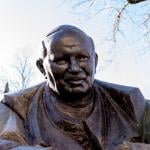THE QUESTION:
A word gets surprising media attention. What does biblical “inerrancy” mean?
THE RELIGION GUY’S ANSWER:
A February article by Stephen Young of Appalachian State University in North Carolina pulls the “inerrancy” of the Bible into a surprising media spotlight. Writing in the liberal religiondispatches.org, Young blames this concept for American Christian racism and “white patriarchy” that subjugates women. By coincidence, days before Young’s posting Michael F. Bird of Ridley College, an Anglican seminary in Australia, contended via the interfaith patheos.com that his fellow evangelicals in the U.S. advocate a version of inerrancy that’s a bit skewed.
Hold those thoughts while the Memo sketches some background.
Merriam-Webster defines inerrancy as “exemption from error,” with “infallible” as a synonym. However, the modern debate distinguishes between those two words, as we’ll see below. Churchgoers may simply view the Bible as trustworthy because, after all, it’s the Word of God, but “inerrancy” is a more sweeping contention meant to cover every detail of the events depicted in the Bible.
Inerrancy came to the fore, especially among U.S. Protestants, through Princeton Theological Seminary professors such as B.B. Warfield (1851-1921) who believed Christianity had always taught the Bible is error-proof. As theological “modernism” made inroads, the largest Presbyterian denomination in 1910 defined five tenets as “essential doctrine” required of clergy candidates. The first one stated that “the Holy Spirit did so inspire, guide and move the writers of the Holy Scriptures as to keep them from error.” The 1910 platform evolved into the “five points of Fundamentalism,” embraced by that militant new movement even as the Presbyterians themselves moved away from their requirement.
Though Protestants have dominated these discussions, in 1965 the world’s Catholic bishops at the Second Vatican Council issued an authoritative “dogmatic constitution” on the Bible, Dei Verbum. It declares that the biblical books “have God as their author” and consequently “must be acknowledged as teaching solidly, faithfully and without error that truth which God wanted put into sacred writings.” The Lausanne Covenant, issued by a 1974 meeting of 2,400 evangelicals from 150 countries, proclaims the Bible to be “without error in all that it affirms, and the only infallible rule of faith and practice.”
Astute readers will notice that these statements leave open to interpretation whether each and every assertion in the Bible is the truth God wanted to be written, or just what the biblical writers intended to affirm. To close any loopholes, in 1978 and again in 1982 the International Council on Biblical Inerrancy held meetings of conservative Protestant scholars in Chicago to fashion statements that are worth reading in full (see defendinginerrancy.com/Chicago statements).
These Protestants declared that the Bible in its entirety is free “from all falsehood, fraud, or deceit” so inerrancy is not “limited to spiritual, religious or redemptive themes, exclusive of assertions in the fields of history and science,” for instance the account of creation in Genesis. “Inerrancy” thus functions as a more sweeping claim than “infallibility,” which can mean the Bible is totally faithful in conveying divine spiritual truth even if it might include some mistakes on history.
“Literal” interpretation is another aspect. To be precise, the scholars at Chicago saw literalism only where the biblical writers meant to be literal. And they added qualifications (as did the Vatican Council). For example, the Bible may lack “modern technical precision,” contain irregular grammar and spelling, employ hyperbole and round numbers, or have “free citations” from other writings. And yes, there are “alleged errors and discrepancies that have not yet been resolved.”
Another key qualification: Scholarly members of America’s Evangelical Theological Society, founded in 1949, affirm that “the Bible alone, and the Bible in its entirety, is the Word of God written and is therefore inerrant in the autographs.” So only the now-lost original manuscripts in Hebrew and Greek were absolutely inerrant. Some mistakes and confusions crept in during thousands of years of transmission and translation. Experts assess variations among ancient manuscripts to get modern translations as close as possible to the original wordings. Despite this technicality, conservatives insist, the Bibles we read today are fully reliable.
Bird’s article (take a look at www.patheos.com/blogs/euangelion/2021/02/is-inerrancy-a-fundamentalist-doctrine) says current versions of inerrancy are not exactly what was taught over the centuries because the context is answering “modernist” attacks. When some Americans “acclaim the inerrancy of the text they mean the inerrancy of their interpretation and the hegemony of their tribe” on things like “a literal Adam, a literal seven-day creation, male-only ordination.”
Which brings us back to Young’s lament. He notes many 19th Century slaveowners and supporters of the 20th Century South’s Jim Crow oppression of African-Americans believed in inerrancy. True, but that doesn’t describe inerrantists over-all. Evil applications do not logically disprove claims of Scripture’s factual accuracy, and no serious Christian thinker today links inerrancy with racism.
Young arguably has a more of a point on the women’s issue. In the midst of the old “Fundamentalist-Modernist” conflict, the large Southern Baptist Convention issued a 1925 statement of faith that declared the Bible “has God for its author, salvation for its end, and truth, without any mixture of error, for its matter.” The Baptists’ 1980 rewrite links that same tenet with the beliefs that “the office of pastor is limited to men” and “a wife is to submit herself graciously to the servant leadership of her husband.” ‘
For further reading on evangelical thought, see the four definitions at https://drmsh.com/definitions-of-inerrancy/ and the lengthy exposition at www.cslewisinstitute.org/webfm_send/555/.












